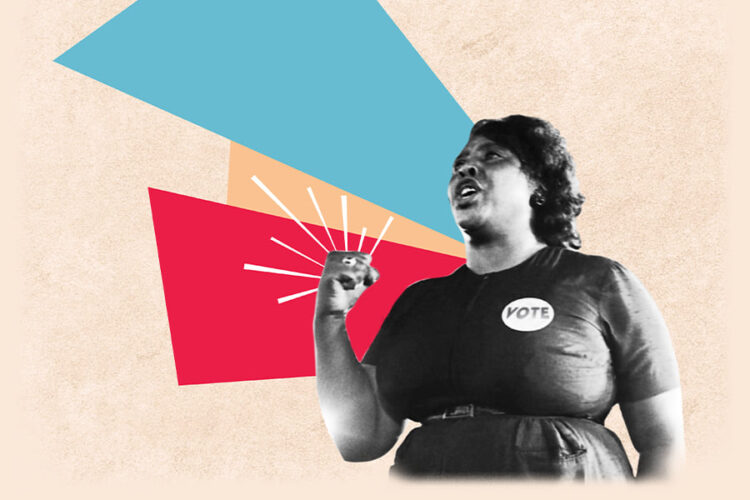BOOKS
Until I Am Free: Fannie Lou Hamer’s Enduring Message to America (2021)
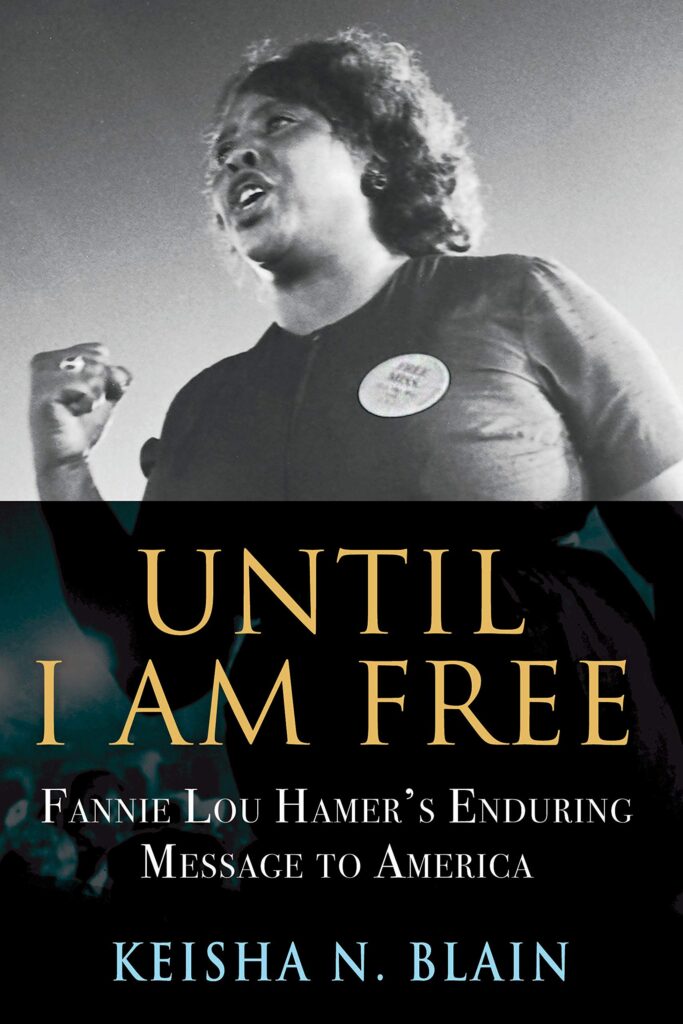
National Book Critics Circle 2021 Biography Finalist
53rd NAACP Image Award Nominee: Outstanding Literary Work – Biography/Autobiography
“[A] riveting and timely exploration of Hamer’s life. . . . Brilliantly constructed to be both forward and backward-looking, Blain’s book functions simultaneously as a much-needed history lesson and an indispensable guide for modern activists.”—New York Times Book Review
Ms. Magazine “Most Anticipated Reads for the Rest of Us – 2021” · KIRKUS STARRED REVIEW · BOOKLIST STARRED REVIEW · Publishers Weekly Big Indie Books of Fall 2021
Explores the Black activist’s ideas and political strategies, highlighting their relevance for tackling modern social issues including voter suppression, police violence, and economic inequality.
“We have a long fight and this fight is not mine alone, but you are not free whether you are White or Black until I am free.”
—Fannie Lou Hamer
A blend of social commentary, biography, and intellectual history, Until I Am Free is a manifesto for anyone committed to social justice. The book challenges us to listen to a working-poor and disabled Black woman activist and intellectual of the civil rights movement as we grapple with contemporary concerns around race, inequality, and social justice.
Award-winning historian and New York Times best-selling author Keisha N. Blain situates Fannie Lou Hamer as a key political thinker alongside leaders such as Martin Luther King Jr., Malcolm X, and Rosa Parks and demonstrates how her ideas remain salient for a new generation of activists committed to dismantling systems of oppression in the United States and across the globe.
Despite her limited material resources and the myriad challenges she endured as a Black woman living in poverty in Mississippi, Hamer committed herself to make a difference in the lives of others. She refused to be sidelined in the movement and refused to be intimidated by those of higher social status and with better jobs and education. In these pages, Hamer’s words and ideas take center stage, allowing us all to hear the activist’s voice and deeply engage her words, as though we had the privilege to sit right beside her.
More than 40 years since Hamer’s death in 1977, her words still speak truth to power, laying bare the faults in American society and offering valuable insights on how we might yet continue the fight to help the nation live up to its core ideals of “equality and justice for all.”
Includes a photo insert featuring Hamer at civil rights marches, participating in the Democratic National Convention, testifying before Congress, and more.
*
Walk with Me: A Biography of Fannie Lou Hamer Hardcover – (2021)
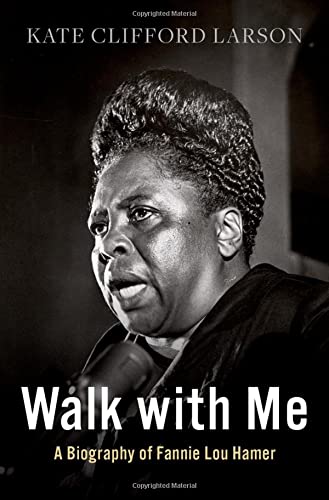
She was born the 20th child in a family that had lived in the Mississippi Delta for generations, first as enslaved people and then as sharecroppers. She left school at 12 to pick cotton, as those before she had done, in a world in which white supremacy was an unassailable citadel. She was subjected without her consent to an operation that deprived her of children. And she was denied the most basic of all rights in America―the right to cast a ballot―in a state in which Blacks constituted nearly half the population.
And so Fannie Lou Hamer lifted up her voice. Starting in the early 1960s and until her death in 1977, she was an irresistible force, not merely joining the swelling wave of change brought by civil rights but keeping it in motion. Working with the Student Non-Violent Coordinating Committee (SNCC), which recruited her to help with voter registration drives, Hamer became a community organizer, women’s rights activist, and co-founder of the Mississippi Freedom Democratic Party. She summoned and used what she had against the citadel―her anger, her courage, her faith in the Bible, and her conviction that hearts could be won over and injustice overcome. She used her brutal beating at the hands of Mississippi police, an ordeal from which she never fully recovered, as the basis of a televised speech at the 1964 Democratic Convention, a speech that the mainstream party―including its standard-bearer, President Lyndon Johnson―tried to contain. But Fannie Lou Hamer would not be held back. For those whose lives she touched and transformed, for those who heard and followed her voice, she was the embodiment of protest, perseverance, and, most of all, the potential for revolutionary change.
Kate Clifford Larson’s biography of Fannie Lou Hamer is the most complete ever written, drawing on recently declassified sources on both Hamer and the civil rights movement, including unredacted FBI and Department of Justice files. It also makes full use of interviews with Civil Rights activists conducted by the Smithsonian and the Library of Congress, and Democratic National Committee archives, in addition to extensive conversations with Hamer’s family and with those with whom she worked most closely. Stirring, immersive, and authoritative, Walk with Me does justice to Fannie Lou Hamer’s life, capturing in full the spirit, and the voice, that led the fight for freedom and equality in America at its critical moment.
*
Voice of Freedom: Fannie Lou Hamer: The Spirit of the Civil Rights Movement Paperback – Illustrated, (2018)
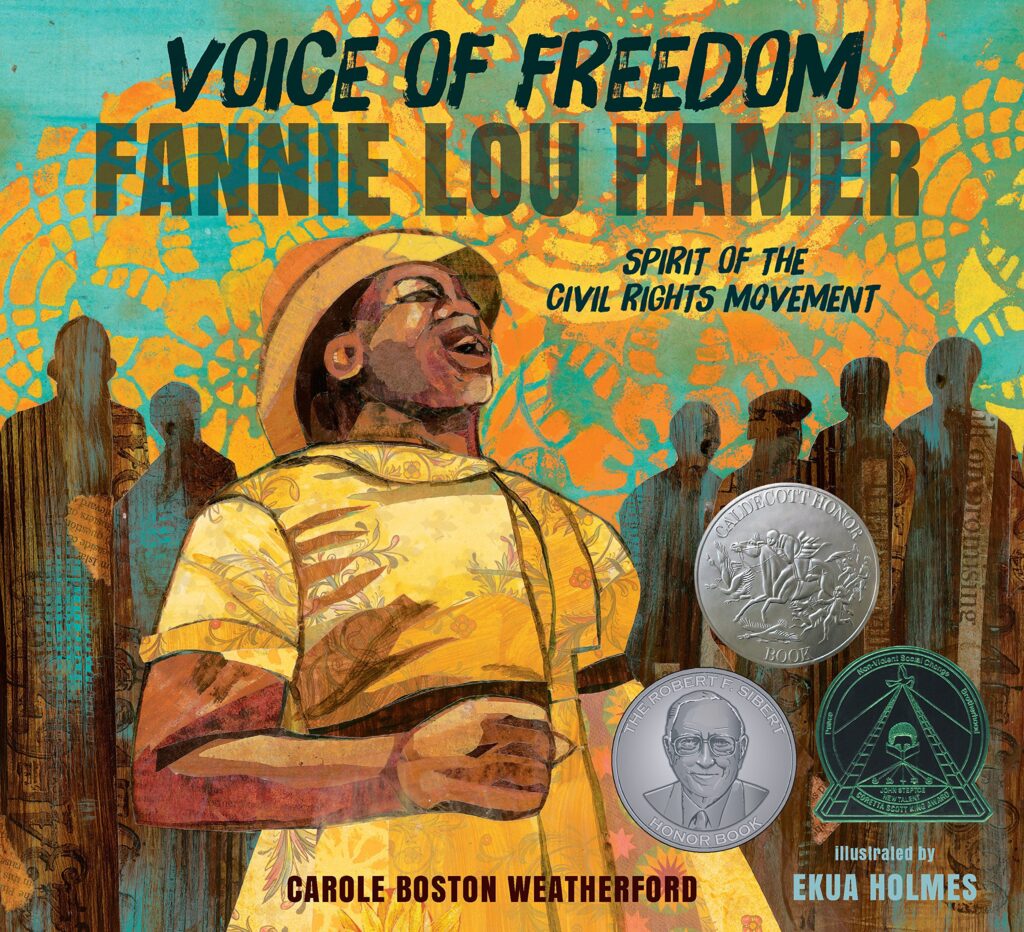
2016 Robert F. Sibert Honor Book
2016 John Steptoe New Talent Illustrator Award Winner
Stirring poems and stunning collage illustrations combine to celebrate the life of Fannie Lou Hamer, a champion of equal voting rights.“I am sick and tired of being sick and tired.”Despite fierce prejudice and abuse, even being beaten to within an inch of her life, Fannie Lou Hamer was a champion of civil rights from the 1950s until her death in 1977. Integral to the Freedom Summer of 1964, Ms. Hamer gave a speech at the Democratic National Convention that, despite President Johnson’s interference, aired on national TV news and spurred the nation to support the Freedom Democrats. Featuring vibrant mixed-media art full of intricate detail, Voice of Freedom celebrates Fannie Lou Hamer’s life and legacy with a message of hope, determination, and strength.
The Speeches of Fannie Lou Hamer: To Tell It Like It Is (Margaret Walker Alexander Series in African American Studies) (2013)
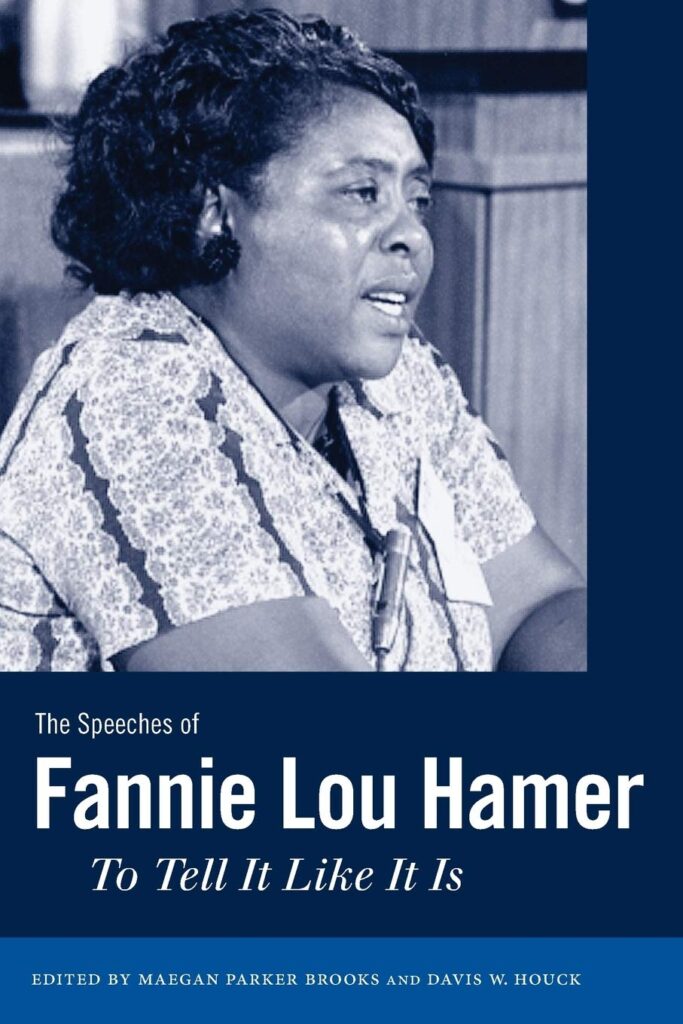
Most people who have heard of Fannie Lou Hamer (1917–1977) are aware of the impassioned testimony that this Mississippi sharecropper and civil rights activist delivered at the 1964 Democratic National Convention. Far fewer people are familiar with the speeches Hamer delivered at the 1968 and 1972 conventions, to say nothing of addresses she gave closer to home, or with Malcolm X in Harlem, or even at the founding of the National Women’s Political Caucus. Until now, dozens of Hamer’s speeches have been buried in archival collections and in the basements of movement veterans. After years of combing library archives, government documents, and private collections across the country, Maegan Parker Brooks and Davis W. Houck have selected twenty-one of Hamer’s most important speeches and testimonies.
As the first volume to exclusively showcase Hamer’s talents as an orator, this book includes speeches from the better part of her fifteen-year activist career delivered in response to occasions as distinct as a Vietnam War Moratorium Rally in Berkeley, California, and a summons to testify in a Mississippi courtroom.
Brooks and Houck have coupled these heretofore unpublished speeches and testimonies with brief critical descriptions that place Hamer’s words in context. The editors also include the last full-length oral history interview Hamer granted, a recent oral history interview Brooks conducted with Hamer’s daughter, as well as a bibliography of additional primary and secondary sources. The Speeches of Fannie Lou Hamer demonstrate that there is still much to learn about and from this valiant black freedom movement activist.
*
This Little Light of Mine: The Life of Fannie Lou Hamer (Civil Rights and the Struggle for Black Equality in the Twentieth Century) – Illustrated (2007)
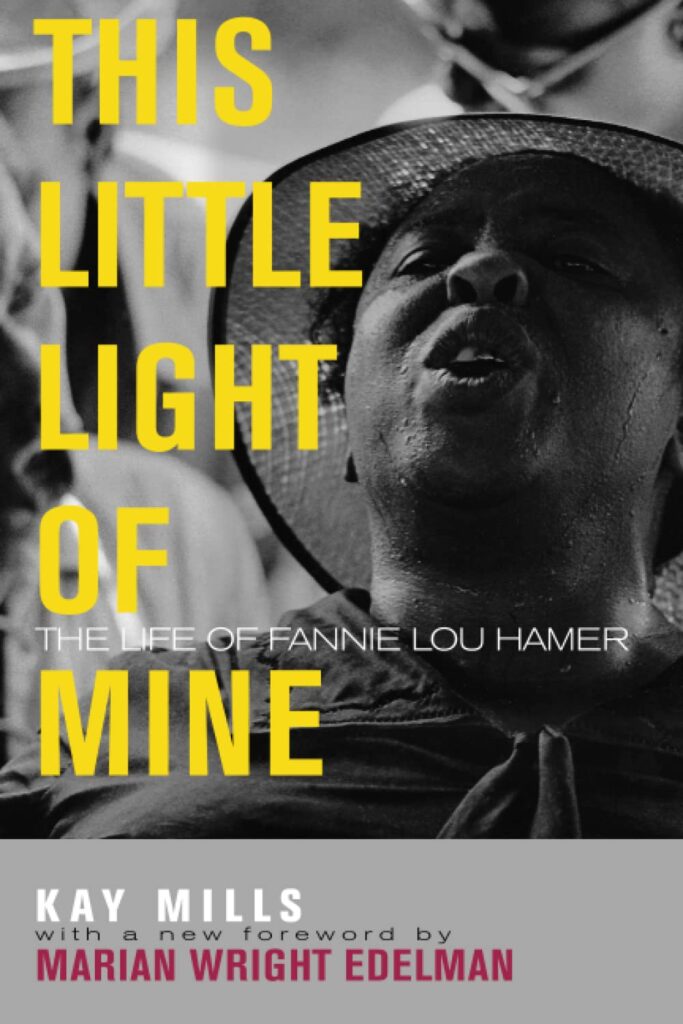
*
Fannie Lou Hamer: The Life of a Civil Rights Icon

This book explores the life of one of Mississippi’s greatest civil rights activists, Fannie Lou Hamer. Known for her daring, brinkmanship, and her impassioned speech-making, Hamer rose to prominence in the Mississippi Freedom Democratic Party, an intrepid group that tried to unseat the predominantly white Democrats of Mississippi during the 1964 Democratic National Convention. She is particularly remembered for her speech before the Credentials Committee, seeking to end all-White representation of her home state. Hamer fought her entire life to expand freedom and basic rights to African Americans in the United States.
*
A Voice That Could Stir an Army: Fannie Lou Hamer and the Rhetoric of the Black Freedom Movement (Race, Rhetoric, and Media Series) Paperback – February 12, 2016
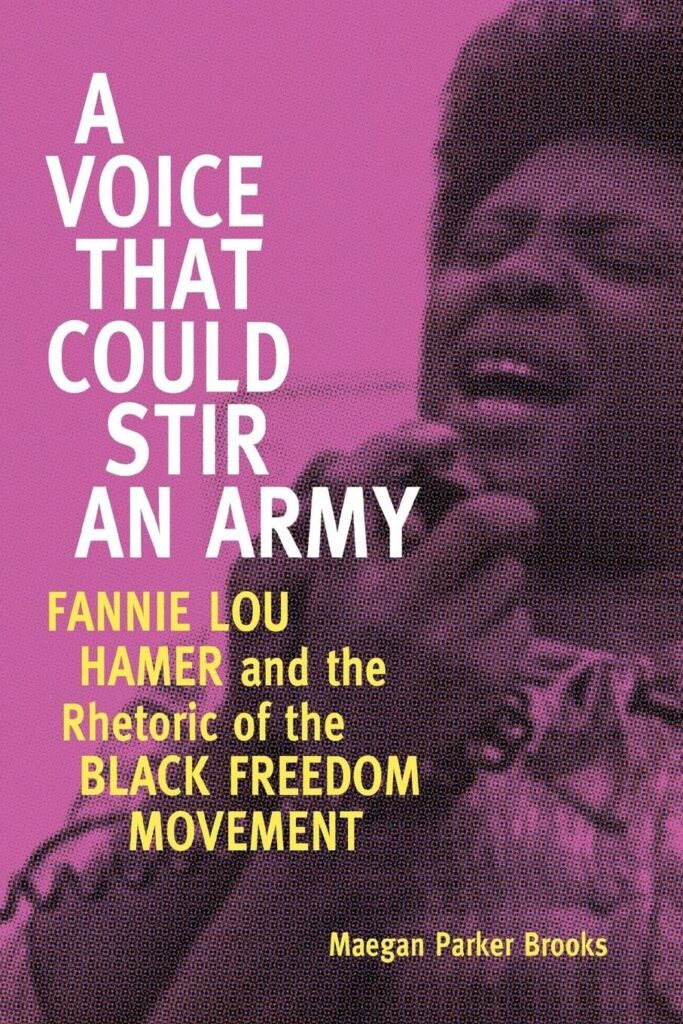
A sharecropper, a warrior, and a truth-telling prophet, Fannie Lou Hamer (1917–1977) stand as a powerful symbol not only of the 1960s black freedom movement but also of the enduring human struggle against oppression. A Voice That Could Stir an Army is a rhetorical biography that tells the story of Hamer’s life by focusing on how she employed symbols―images, words, and even material objects such as the ballot, food, and clothing―to construct persuasive public personae, to influence audiences, and to effect social change.
Drawing upon dozens of newly recovered Hamer texts and recent interviews with Hamer’s friends, family, and fellow activists, Maegan Parker Brooks moves chronologically through Hamer’s life. Brooks recounts Hamer’s early influences, her intersection with the Black freedom movement, and her rise to prominence at the 1964 Democratic National Convention. Brooks also considers Hamer’s lesser-known contributions to the fight against poverty and to feminist politics before analyzing how Hamer is remembered posthumously. The book concludes by emphasizing what remains rhetorical about Hamer’s biography, using the 2012 statue and museum dedication in Hamer’s hometown of Ruleville, Mississippi, to examine the larger social, political, and historiographical implications of her legacy.
The sustained consideration of Hamer’s wide-ranging use of symbols and the reconstruction of her legacy provided within the pages of A Voice That Could Stir an Army enriches the understanding of this key historical figure. This book also demonstrates how rhetorical analysis complements historical reconstruction to explain the dynamics of how social movements actually operate.
- Bob Moses, Carole Boston Weatherford, Coretta Scott King, Dale Ricardo Shields, Dale Shields, Debra Michals, Dr. T. R. M. Howard, Earnest N. Bracey, Ekua Holmes, Ella Baker, Fannie Lou Hamer, Harry Belafonte, J. C. Killingsworth, Kate Clifford Larson, Kay Mills, Keisha N. Blain, Mahalia Jackson, Margaret Walker Alexander, Perry Hamer, Rep. Charles Diggs, Rev. James Bevel, Rosa Parks, Thurgood Marshall, Warren K. Leffler
iforcolor
ARCHIVIST, EDUCATOR, HISTORIAN, and ARTiST
Dale Ricardo Shields is a 2017 winner of The Kennedy Center/Stephen Sondheim Inspirational Teacher Award®, 2017 and 2015 Tony® award nominee for the Excellence in Theatre Education Award, the 2017 AUDELCO/"VIV" Special Achievement Award, 2020, 2021, and 2022 ENCORE AWARD / The Actors Fund and winner of the 2022.
Recently, he won the 2022 Legend Award from his alma mater Ohio University.
He is the 2021 winner of the Paul Robeson Award, presented (jointly) by the Actors Equity Association and the Actors Equity Foundation.
Research Accomplishments:
His extensive professional credits as a Director, Stage manager, and Actor (Broadway, Off-Broadway, Off-Off-Broadway, and Regional) As an actor he has appeared on Saturday Night Live, Another World, Guiding Light, The Cosby Show, and the ITV television series "Special Needs" and commercials and film.
Professor Shields is a member of the Actors Equity Association, Screen Actors Guild, the American Federation of Television and Radio Artists, and the American Guild of Musical Artists performance unions and an associate member of the Society of Stage Directors and Choreographers.
He began his artistic academic career in New York City at Playwrights Horizon, The South Bronx Action Theatre, and Mind Builders, and then was invited to join the teaching staff at the Joseph Papp Public Theatre (New York Shakespeare Festival). He represented the United States for Theatre Young Audiences at the ASSITEJ Theatre Festival in London, England.
He has been a Professor and Visiting Artist at Ohio University, The College of Wooster, Denison University, Macalester College, Randolph- Macon College, Susquehanna University, and SUNY Potsdam.
He holds B.F.A and M.F.A, Degrees from Ohio University.
Website(s)
Iforcolor.org [Research]
https://en.wikipedia.org/wiki/Dale_Ricardo_Shields [Career]
© 2024 I For Color.
Made with by Graphene Themes.

